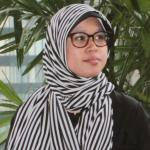Gender equality at COP21
After a year working intensively in one of our campaigns promoting inclusive Urban Climate Change Resilience (UCCR) in Indonesia, Mercy Corps Indonesia together with the Indonesian Municipalities Association (APEKSI), the Center for Regional Research and Information (PATTIRO), and the Ministry of Women Empowerment and Child Protection (KPPPA) has succeeded in developing a national guideline for integrating gender with Climate Change Adaptation. This guideline provides information that enables government agencies to understand the importance and direction of integrating gender and to apply gender equality and social inclusion approach into Urban Climate Change Resilience programs.
Funded by KPPPA, 13 Indonesian cities (Blitar, Mataram, Cirebon, Palembang, Pekalongan, Semarang, Tangerang, Tangerang Selatan, Banjarmasin, Pangkal Pinang, Bekasi, and Pontianak) received training on using the guideline. Training will be continued in at least another three cities (Tarakan, Bandar Lampung, and Probolinggo) before the end of the year. These cities have committed to integrating gender into their development agendas, through measures including budget and resource allocations, provision of gender disaggregated data, capacity building for city agencies, and overall inclusion of gender in their programs.
KPPPA will launch the guideline nationally by the end of this year. It will be available to all local governments across Indonesia and not just limited to cities. KPPPA also plans to work with that National Development Planning Agency (Bappenas) to integrate the guideline with the Indonesian National Action Plan on Climate Change Adaptation to ensure national policy cohesion.
Recognising the importance of this work for Indonesia, KPPPA had also committed itself to include gender and climate resilience in the negotiation agenda and organised "Gender integration into climate policy and program development session" for Indonesia Pavilion together with Asia Pacific Forum for Women, Law and Development, and Philippines; government for COP 21 in Paris on 8 December 2015.
From the outcome document of Paris Agreement, there are several paragraphs that mentioned gender equality. The first is in Preamble: "Acknowledging that climate change is a common concern of humankind, Parties should, when taking action to address climate change, respect, promote and consider their respective obligations on human rights, the right to health, the rights of indigenous peoples, local communities, migrants, children, persons with disabilities and people in vulnerable situations and the right to development, as well as gender equality, empowerment of women and intergenerational equity.”
The second is on article 7 about Adaptation: "Parties acknowledge that adaptation action should follow a country-driven, gender-responsive, participatory and fully transparent approach, taking into consideration vulnerable groups, communities and ecosystems, and should be based on and guided by the best available science and, as appropriate, traditional knowledge, knowledge of indigenous peoples and local knowledge systems, with a view to integrating adaptation into relevant socioeconomic and environmental policies and actions, where appropriate."
On article 11 about capacity building: "Capacity-building should be country-driven, based on and responsive to national needs, and foster country ownership of Parties, in particular, for developing country Parties, including at the national, subnational and local levels. Capacity-building should be guided by lessons learned, including those from capacity-building activities under the Convention, and should be an effective, iterative process that is participatory, cross-cutting and gender-responsive."
The document discussion was extended to one day from the schedule. Although several mentioned above, the struggle of women and gender constituency to campaign and advocate the parties could not be accepted in several condition. For example, in the article about loss and damage and financing, to create access on climate fund for women. The parties only accepted the advocacy in balancing the use of climate funds, because this should be balance between mitigation and adaptation.
Meanwhile climate change world is still male domination. In the next conference, we should fight more to achieve gender equality in climate change.
A copy of the Paris Agreement can be downloaded here.
--
For further information please contact:
Piva Bell
ACCCRN M&E Coordinator and Indonesia Gender Focal Point




